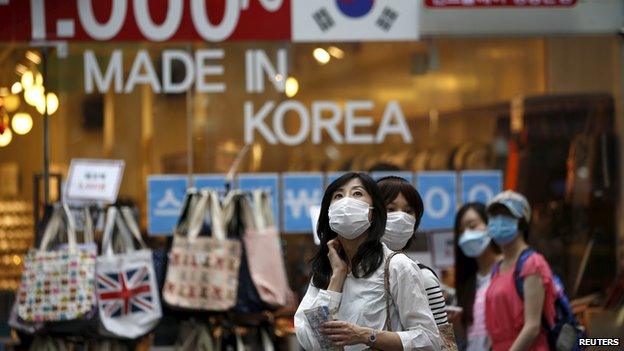Mers outbreak cuts sharply into S Korea growth
- Published

Middle East Respiratory Syndrome (Mers) first emerged in South Korea in May
South Korea's economic growth has been hit sharply by both the Mers outbreak and continued weak exports.
The country's economy grew by a mere 0.3% in the second quarter compared to 0.8% in the year's first three months, marking a six-year record low.
South Korea's economy is struggling with a slump in exports, while Mers has stifled consumer spending and the important tourism sector.
Since 20 May, 186 people have been infected of which 36 have died.
Mers virus explained in 60 seconds
Mers: The new coronavirus explained
"The growth rate is worse than expected," James Rooney, chairman of Market Force Company, told the ǵüµÇ¨û§ from Seoul.
Domestic consumption has suffered and the number of tourists plunged more than 40% in June, since the Middle East Respiratory Syndrome (Mers) outbreak began in May.
"We have to expect that the next quarter is also going to be negatively impacted," Rooney added, cautioning that foreign visitor numbers might not recover until the autumn holiday season later this year.
Currency woes
South Korea had been struggling already before the virus hit.
"Mers' impact was really only felt by June which means that only one month of this quarter can have arguable been affected by it," said Rooney.
"So the Mers effect cannot fully explain that degree of drop."
Exports count for more than half of South Korea's economy and have declining every month of the year so far.
The Korean won's relative strength against the weakening yen and euro have made it harder for exporters to compete on international markets.
Compared to the same quarter in the previous year, the economy expanded by 2.2%, below the Bank of Korea's current target of 2.8%.
In July, the central bank cut its 2015 economic growth forecast for the third time this year, down from from 3.1%.
- Published3 July 2015
- Published2 July 2015
- Published23 July 2015